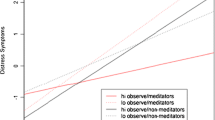Abstract
Although meditation has been employed successfully as a treatment for various stress-related disorders, there is still little evidence clarifying just which aspects of meditation training are responsible for these therapeutic effects. This experiment sought to test the hypothesis that creating two opposite expectations about an initial meditation experience would result in differing physiological and phenomenological responses, even though the same technique was practiced by all subjects. The results of the experiment failed to support this hypothesis.
Similar content being viewed by others
References
Banquet, J. P. Spectral analysis of the EEG in meditation.Electroencephalography and Clinical Neurophysiology 1973,35 143–151.
Benson, H.The relaxation response. New York: Morrow, 1975.
Benson, H., Rosner, B. A., & Marzetta. Decreased systolic blood pressure in hypertensive subjects who practiced meditation.Journal of Clinical Investigations 1973,52 8.
Carrington, P.Freedom in meditation. New York: Anchor Press, 1977.
Das, N. N., & Gastaut, H. Variations de l'activite electrique du cerveau, du coeur et des muscles squelletiques au cours de la meditation et de l'extase Yogique.Electroencephalography and Clinical Neurophysiology 1955,Suppl. 7 132–149.
Kasamatsu, A., & Hirai, T. An electroencephalographic study on the Zen meditation (ZAZEN).Psychologia 1969,12 205–225.
Lehrer, P. M., Schoicket, S., Carrington, P., & Woolfolk, R. L. Psychophysiological effects of progressive relaxation and clinically standardized meditation in response to stress.Behaviour Research and Therapy 1980,18 293–304.
Malec, J., & Sipprelle, C. N. Physiological and subjective effects of Zen meditation and demand characteristics.Journal of Consulting and Clinical Psychology 1977,45 339–340.
McCaul, K. D., Solomon, S., & Holmes, D. S. Effects of paced respiration and expectations on physiological and psychological responses to threat.Journal of Personality and Social Psychology 1979,37 564–571.
Orme-Johnson, D. W., & Farrow, J. T. (Eds.).Scientific research on the transcendental meditation program: Collected papers. New York: MIU Press, 1978.
Orne, M. T. On the social psychology of the psychological experiment: With particular reference to demand characteristics and their implications.American Psychologist 1962,17 776–783.
Spielberger, C. D., Gorsuch, R. L., & Lushene, R. E.The State-Trait Anxiety Inventory: Preliminary test manual for Form X. Tallahassee: Florida State University, 1968.
Stroebel, C. F., & Glueck, B. C. Biofeedback treatment in medicine and psychiatry: An ultimate placebo?Seminars in Psychiatry 1973,5 379–393.
Wallace, R. K., Benson, H., & Wilson, E. F. A wakeful hypometabolic physiological state.American Journal of Physiology 1971,221 795–799.
Wegner, M. A., & Bagchi, B. K. Studies of autonomic functions in practitioners of Yoga in India.Behavioral Science 1961,6 312–323.
Wilson, A. F., & Honsberger, R. The effects of transcendental meditation upon bronchial asthma.Clinical Research 1973,21 278.
Woolfolk, R. L. Psychophysiological correlates of meditation.Archives of General Psychiatry 1975,32 1326–1333.
Woolfolk, R. L., Carr-Kaffashan, L., McNulty, T. F., & Lehrer, P. M. Meditation as a treatment for insomnia.Behavior Therapy 1976,7 359–365.
Woolfolk, R. L., & Richardson, F. C.Stress, sanity and survival. New York: Simon & Schuster, 1978.
Author information
Authors and Affiliations
Rights and permissions
About this article
Cite this article
Woolfolk, R.L., Rooney, A.J. The effect of explicit expectations on initial meditation experiences. Biofeedback and Self-Regulation 6, 483–491 (1981). https://doi.org/10.1007/BF00998733
Issue Date:
DOI: https://doi.org/10.1007/BF00998733




